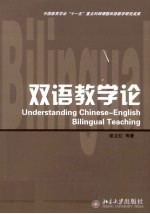图书介绍
双语教学论PDF|Epub|txt|kindle电子书版本网盘下载

- 欧卫红等著 著
- 出版社: 北京市:北京大学出版社
- ISBN:9787301158326
- 出版时间:2009
- 标注页数:319页
- 文件大小:87MB
- 文件页数:332页
- 主题词:双语教学-教学研究
PDF下载
下载说明
双语教学论PDF格式电子书版下载
下载的文件为RAR压缩包。需要使用解压软件进行解压得到PDF格式图书。建议使用BT下载工具Free Download Manager进行下载,简称FDM(免费,没有广告,支持多平台)。本站资源全部打包为BT种子。所以需要使用专业的BT下载软件进行下载。如BitComet qBittorrent uTorrent等BT下载工具。迅雷目前由于本站不是热门资源。不推荐使用!后期资源热门了。安装了迅雷也可以迅雷进行下载!
(文件页数 要大于 标注页数,上中下等多册电子书除外)
注意:本站所有压缩包均有解压码: 点击下载压缩包解压工具
图书目录
Chapter One Basic Theories1
1.1 Theories of first language acquisition and learning1
1.1.1 Language acquisition and language learning1
1.1.2 Theories of first language acquisition2
1.1.3 Language acquisition view of cognitive linguistics9
1.1.4 Language development12
1.1.5 The critical period hypothesis14
1.2 Theories of second language learning and acquisition18
1.2.1 Critical period of second language learning and acquisition18
1.2.2 Theories of second language acquisition20
1.2.3 Practical pedagogical implications of SLA research27
1.2.4 Individual learner differences and second language acquisition30
1.2.5 Interlanguage35
1.3 Theories of bilingual learning and acquisition43
1.3.1 Appellation43
1.3.2 Definitions44
1.3.3 Types of bilingual teaching models44
1.3.4 Bilingual education examples across the world47
1.3.5 Chinese-English bilingual teaching in China55
1.3.6 The critical period hypothesis of bilingual teaching60
Chapter Two Teaching Methodology67
2.1 Main ideas about English teaching methodology67
2.1.1 Language and language teaching67
2.1.2 The New National English Curriculum72
2.1.3 Current English teaching methodology73
2.1.4 Lesson planning81
2.1.5 Classroom management87
2.1.6 Assessment in language teaching88
2.1.7 Classroom English90
2.2 Main ideas about subject methodology93
2.2.1 Main ideas about math teaching methodology93
2.2.2 Main ideas about science teaching methodology104
2.2.3 Main ideas about music teaching methodology113
2.3 Main ideas about bilingual teaching methodology125
2.3.1 Teaching goals125
2.3.2 Teaching models and strategies126
2.3.3 Code-switching134
2.3 4 Bilingual teaching methodology in some subjects173
Reference books182
Chapter Three Grammatical Points for Bilingual Teaching185
3.1 Verb and tense185
3.1.1 Main verbs185
3.1.2 Auxiliaries186
3.1.3 Tenses187
3.2 Subject-Verb concord192
3.2.1 Brief introduction about concord192
3.2.2 The common rule of agreement193
3.3 Participle196
3.4 Commonly used sentence patterns197
3.4.1 Existential sentence pattern197
3.4.2 It-patterns197
3.4.3 Conditional sentences198
3.5 Simple sentence199
3.5.1 Positive and negative statements199
3.5.2 Questions200
3.5.3 Commands201
3.5.4 Exclamations202
3.6 Clause202
3.6.1 Clause element202
3.6.2 Basic clause types202
3.7 Degree and construction204
3.7.1 Degree of adjectives and adverbs204
3.7.2 Typical comparative structures205
3.8 Direct and indirect speech208
3.9 Infinitive209
3.10 Passive voice209
3.11 Some issues210
Reference books213
Chapter Four Resources for Bilingual Classroom Teaching215
4.1 Subject English words and expressions215
4.1.1 Mathematics215
4.1.2 Science236
4.1.3 Music248
4.2 Sample lesson plan analysis276
4.2.1 Sample 1276
Analysis of Sample 1281
4.2.2 Sample 2282
Analysis of Sample 2284
4.2.3 Sample 3285
Chapter Five Teacher Development295
5.1 Introduction to teacher development and its research293
5.1.1 Some concepts in teacher development293
5.1.2 The importance of teachers'professional development295
5.1.3 Approaches to teacher development296
5.2 Teacher development in bilingual teaching297
5.2.1 Building subject expertise298
5.2.2 Improving Language proficiency299
5.2.3 Developing bilingual teaching skills300
Glossary and Index307